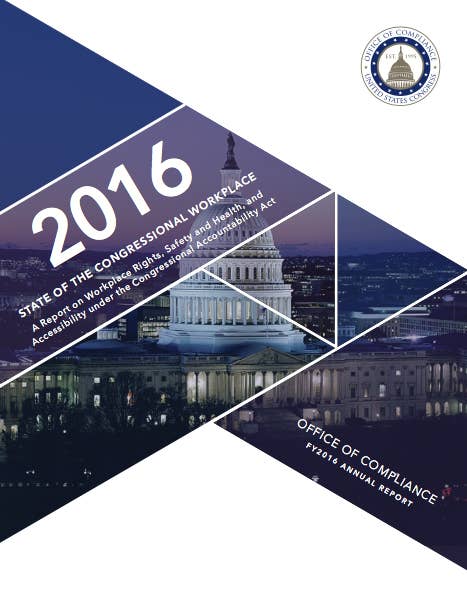
WASHINGTON — More than 20 years ago, congressional leaders gave speeches promising accountability and transparency in the workplace when they created the Office of Compliance — the opaque and bureaucratic office at the heart of how Capitol Hill has secretly handled sexual harassment claims in the decades since.
As Americans grapple with daily stories of sexual harassment and abuse, scrutiny has now come to Washington and the Office of Compliance, which uses taxpayer money from a special fund to settle claims. Now the office is dodging key questions about about how it handles settlements — and their disclosure — compounding criticism that it has been used essentially as a way to cover up bad behavior.
Created by the Congressional Accountability Act (CAA) to help legislative branch employees who allege civil rights and other workplace violations, the Office of Compliance has kept the public in the dark for the most part about which lawmakers or offices have been accused of improper workplace behavior. The claims can range from sexual harassment or racial discrimination to workplace safety or labor law violations. Last week, BuzzFeed News revealed a settlement reached between Rep. John Conyers and a former employee who accused him of sexual harassment and wrongful termination under the CAA. Conyers acknowledged the settlement but has adamantly denied the allegation.
By law, the office is required to issue an annual report to the public that details the number of people who “initiated proceedings” with the office — called “requests for counseling,” which is the very beginning of the claims process. A BuzzFeed News review of the 21 years of annual reports from the Office of Compliance found that more than 400 House and Senate employees have made requests for counseling — meaning they alleged that their rights at work were violated — since the office opened in 1996.

Due to the secrecy imbued in the process, however, there is virtually no way to know what happened with those 400 requests, despite the fact that the allegations were levied against elected officials or the people they’ve hired. The office’s reports detail what happens, broadly, with all requests and complaints, but it does not differentiate what happened with the cases brought by employees of House or Senate offices, including whether a settlement was reached to resolve their allegations.
Under pressure, the office, in a letter from Executive Director Susan Tsui Grundmann, recently released information detailing that $17 million in settlements or awards have been distributed under the CAA. Those settlements and awards include a much broader segment of the federal workforce than just people who work for the House or Senate.
It’s not clear, however, that the Office of Compliance is required to keep secret all settlements. A spokesperson for the Office of Compliance did not respond to a request for comment about whether the office takes the position that it is barred, either by law or by its own rules, from publicizing annual settlement sums and including an office-by-office breakdown instead of yearly totals. Thus far, though, the office has kept the specifics of awards and settlements under wraps, and when asked to comment on the Conyers settlement, a spokesperson said “the OOC cannot comment on whether matters have or have not been filed with the office,” citing the CAA as the reason.
The law itself, however, expresses competing aims of confidentiality and transparency — a weighing of interests often considered in legislation addressing circumstances where accusations are raised and victims might desire protections from disclosure.
The law establishes a limited preference for secrecy at points in the process. The confidentiality section of the law first details that counseling and mediation “shall be strictly confidential.” For those allegations that move on to the formal complaint process because counseling and mediation did not resolve the matter, the “proceedings and deliberations” of hearing officers and the Office of Compliance’s Board of Directors are confidential.
But at the same time, the law also details an expectation of transparency about decisions against employers and a desire for accountability through the requirement that the office publish those annual statistics on the allegations and complaints it processes. “Final decisions” of the board can be public — and are required to be public in some circumstances. A review of the published board decisions shows eight relate to claims brought by House or Senate employees — regarding five current or former members of the House and one Senate committee. Only one (former) member of Congress ultimately lost at the board decision level: Former Rep. Eric Massa lost in two board decisions alleging that former employees had violated the CAA’s confidentiality provisions.
Those published board decisions do not address any awards issued under the CAA, let alone settlements reached under the law. Some members of congress, including Ohio Sen. Rob Portman, have said that all settlements should be made public.
Further still, BuzzFeed News reported that the Conyers settlement came, at least on its face, out of Conyers’ office fund — and not out of the CAA’s fund for settlements. The law, however, mandates that all settlements reached under the law must come out of that fund and must be approved by the Office of Compliance’s executive director.
Despite Conyers' acknowledgement of the settlement, the OOC won’t address why the settlement was made this way and if there are others like it — settlements masked as staff payments on congressional spending records. California Rep. Jackie Speier, an advocate for changing the process, has said the way the settlement was paid should be investigated.
In short, the public can assess very little about what happens to complaints of workplace discrimination due to the way the office established by and ultimately overseen by Congress has chosen to present statistics about what it does.
The CAA was meant to do the very opposite.
“This is about common sense, trust, and accountability,” Democratic Rep. Steny Hoyer said early in the morning on Jan. 5, 1995, as the House debated legislation that eventually became the CAA. Of “our employees,” he said, “That really is the crux of this issue, so that we can protect them as we have protected others throughout this country.”
The Democratically controlled House first passed the legislation in 1994 — but it later became part of the Contract With America, the Newt Gingrich-led pitch to voters that Republicans would make Congress more responsible and accountable to them. In fact, the CAA was the first legislation passed by the new Republican congress led by Gingrich and Majority Leader Bob Dole.
“We have all heard the old phrase that Congress would exempt itself from the law of gravity if it thought it could get away with it,” said Republican Rep. Harris Fawell in 1995. “And, indeed, Congress has tried to get away with it for a long time. But that is changing now.”

Despite today’s criticism of the Office of Compliance, the circumstances before the CAA was passed were, in most respects, worse for Capitol Hill staffers alleging mistreatment at work.
Each chamber had an “Office of Fair Employment Practices” to take employment complaints — but Senate and House committees were granted the final review of those complaints. House employees didn’t even have the option of judicial review.
By the mid-1990s, there was a consensus that those processes weren’t working, and rendered Congress a privileged, exempt body. Rep. Eva Clayton — the first black woman to represent North Carolina in Congress — argued, as other Democrats did, that Congress ought to foster a fair environment. “If discrimination occurs in Congress, there should be protection from it, regardless of race, creed, color, sex, age, family status, physical condition, or any other protected class. Labor practices should be fair, the workplace should be safe, and fair notice and retraining should be the expectation of those who work here,” she said. “We have outlived the days when Congress can expect special and different treatment from the average employer.”
For the Republicans, Rep. Peter Blute from Massachusetts was one of several who spoke out in agreement. “Tonight we have an opportunity to do something about the perception out there in the land that Members of Congress are somehow a privileged elite. We have an opportunity to do something about the view of our constituents that somehow we are above the law. We have an opportunity to show our constituents that we are not in a distant capital and not understanding of their real-world problems,” he said. “Worst of all is the perception that the Congress is an arrogant institution. We have an opportunity tonight to deal with that issue.”
Even then, however, some members raised concerns about the limits on the new process that would be put in place by the quasi-independent Office of Compliance. Fawell, an Illinois Republican, noted, “Under this bill, all members of Congress, senators, and heads of employing offices are totally shielded from any financial liability resulting from wrongdoing, even in proven cases of egregious violations of the law” — because settlement and award payments would come out of a new fund under the auspices of the Office of Compliance.
In the Senate, Sen. Chuck Grassley worked closely with Sen. John Glenn to move the bill forward on a bipartisan basis, along with support from Sens. Joseph Lieberman and Fred Thompson.
In pressing for passage of the bill, Dole — the new majority leader of the Senate that year — spoke out about his support for the legislation, highlighting the conservative argument for it in the wake of the 1994 elections.
“For far too long, Congress has severed its connection with the people, imposing new rules and regulations on the private sector, while seeking to exempt itself from those same rules,” he said. “Not surprisingly, many of our citizens have begun to view the Senate and the House of Representatives as the Imperial Congress, as an institution that considers itself above the law and without accountability.”
Although there was pushback from some Democratic members about the process and framing of legislation that they said they had been seeking to pass before the Republicans took over Congress, the Senate’s version of the legislation passed quickly and nearly unanimously — Sen. Robert Byrd was the only "no" vote in either chamber — and President Bill Clinton signed the CAA into law on Jan. 23, 1995.
Since then, Congress has only made minor amendments to the law.
If you have information or tips, there are a number of ways to securely share information with BuzzFeed News, including SecureDrop and postal mail. You can also email us at tips@buzzfeed.com or send us an encrypted message over Signal at (646) 379-1975. The best tips include specific information and documentation in addition to names. You can learn more about how to reach us here.

